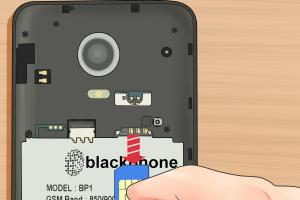Mastering the Art of SIM Card Switching: A Comprehensive Guide

-
Quick Links:
- Introduction
- Understanding SIM Cards
- Types of SIM Cards
- Compatibility Check
- How to Switch SIM Cards
- Troubleshooting Common Issues
- Case Studies
- Expert Insights
- The Future of SIM Cards
- FAQs
Introduction
Switching SIM cards is a crucial skill for mobile phone users, whether you're changing carriers, upgrading your device, or simply needing to swap SIMs for travel. This comprehensive guide will walk you through the entire process, ensuring that you can manage your mobile needs efficiently and effectively.
Understanding SIM Cards
A Subscriber Identity Module (SIM) card is an essential component of mobile phones, containing the International Mobile Subscriber Identity (IMSI) that allows your device to connect to a mobile network. SIM cards store your phone number, contacts, and text messages. Understanding their function is key to managing them successfully.
Types of SIM Cards
There are various types of SIM cards available:
- Standard SIM: The largest SIM, now mostly outdated.
- Micro SIM: Smaller than the standard SIM, used in many older smartphones.
- Nano SIM: The smallest SIM, standard for most modern devices.
- eSIM: An embedded SIM that can be activated without a physical card.
Compatibility Check
Before switching SIM cards, it's vital to check compatibility. Consider the following:
- Device Compatibility: Ensure your new SIM card fits your device's SIM slot.
- Network Compatibility: Confirm that your device is unlocked and compatible with the new carrier's network.
- SIM Size: Make sure you have the correct SIM size (Standard, Micro, Nano).
How to Switch SIM Cards
Follow these step-by-step instructions to switch SIM cards smoothly:
Step 1: Gather Your Tools
You will need:
- Your new SIM card
- Your device with the old SIM card
- A SIM eject tool or a paperclip
Step 2: Power Off Your Device
Always power off your device before removing or inserting a SIM card to avoid damage.
Step 3: Locate the SIM Card Tray
Different devices have different locations for the SIM card tray:
- Usually on the side of the phone for smartphones.
- Under the back cover for some older models.
Step 4: Eject the SIM Card Tray
Use the SIM eject tool to remove the SIM tray gently.
Step 5: Remove the Old SIM Card
Carefully take out the old SIM card from the tray.
Step 6: Insert the New SIM Card
Place the new SIM card in the tray, ensuring it's aligned correctly.
Step 7: Reinsert the SIM Card Tray
Push the tray back into the device until it clicks.
Step 8: Power On Your Device
Turn your device back on and wait for it to recognize the new SIM card.
Troubleshooting Common Issues
If you encounter issues after switching SIM cards, consider these troubleshooting tips:
- No Signal: Ensure the SIM card is properly seated in the tray.
- Invalid SIM: Verify that the SIM is activated and compatible with your device.
- Network Errors: Restart your device and check for carrier settings updates.
Case Studies
To illustrate the importance of knowing how to switch SIM cards, here are two real-world case studies:
Case Study 1: Traveling Abroad
A traveler switched to a local SIM card to avoid international roaming charges, saving over 70% on mobile data costs.
Case Study 2: Changing Carriers
A customer switched from a high-cost carrier to a budget-friendly option, enjoying the same service quality at half the price.
Expert Insights
Industry experts recommend keeping multiple SIM cards for travel and cost management. They emphasize understanding your device’s capabilities, especially with the rise of eSIM technology.
The Future of SIM Cards
With the advent of eSIM technology, the future of SIM cards is evolving. eSIMs allow for remote provisioning, making it easier for users to switch carriers without physical SIM card swaps.
FAQs
1. Can I switch SIM cards between different carriers?
Yes, as long as your device is unlocked and compatible with the new carrier's network.
2. What happens to my data when I switch SIM cards?
Your contacts and text messages stored on the SIM will be transferred, but data stored on the device will remain.
3. Do I need to inform my carrier when switching SIM cards?
It's advisable to inform your carrier, especially if you're changing to a different provider.
4. How do I know if my SIM card is activated?
Check with your carrier; they often provide confirmation via text or email once the SIM is activated.
5. Can I use a SIM card from a different country?
Yes, but ensure that your device is unlocked and compatible with international networks.
6. How do I unlock my phone for a different SIM?
Contact your carrier for unlocking instructions or requirements.
7. Is it possible to have multiple SIM cards active on one device?
Yes, if your device supports dual SIM functionality or eSIM technology.
8. Can I switch SIM cards while the phone is on?
It's not recommended; always power off your device first to avoid damage.
9. Will switching SIM cards affect my phone settings?
Switching SIMs generally does not change your phone settings, but network-specific settings may need to be updated.
10. How often can I switch SIM cards?
You can switch SIM cards as often as you like, provided your device supports it.
Conclusion
Switching SIM cards is a straightforward process that can save you money and enhance your mobile experience. By understanding the types, compatibility, and troubleshooting techniques, you'll be well-prepared to navigate your mobile needs with confidence.